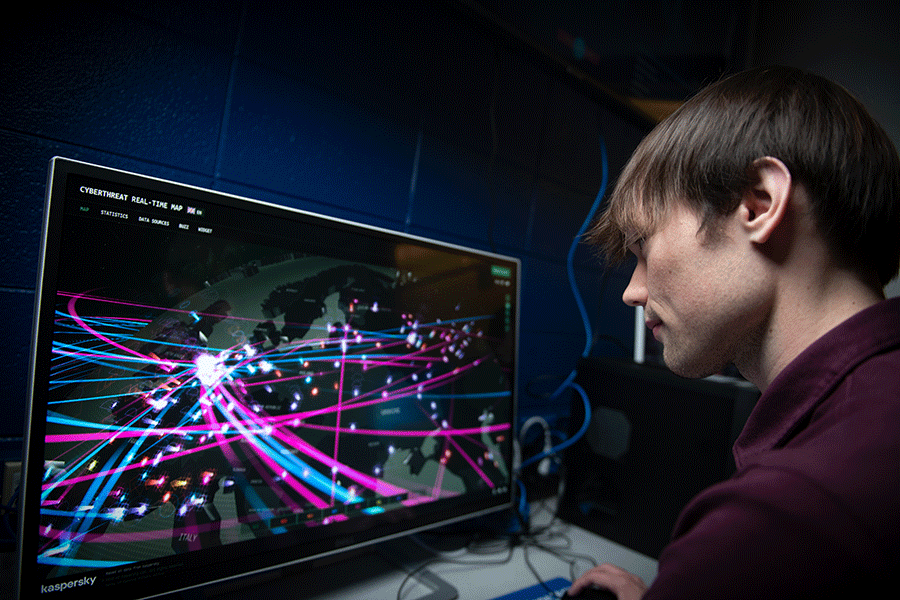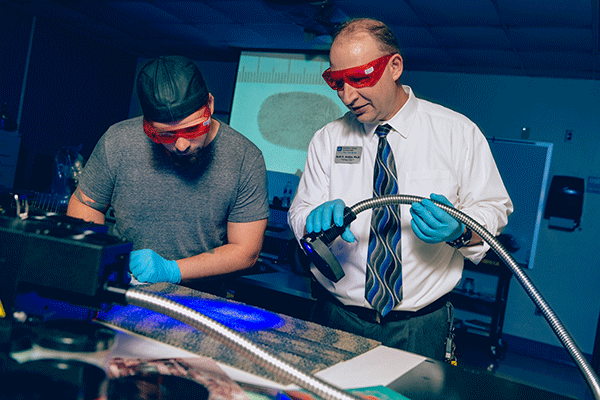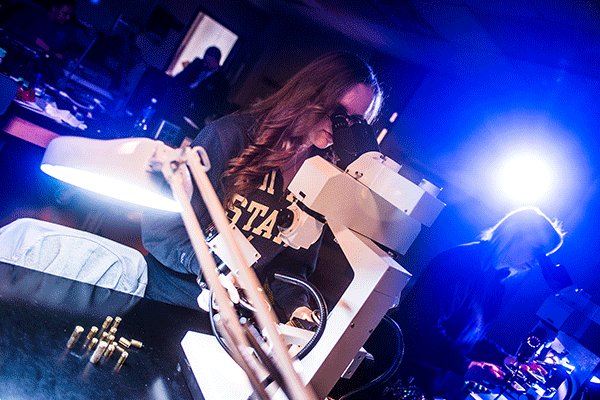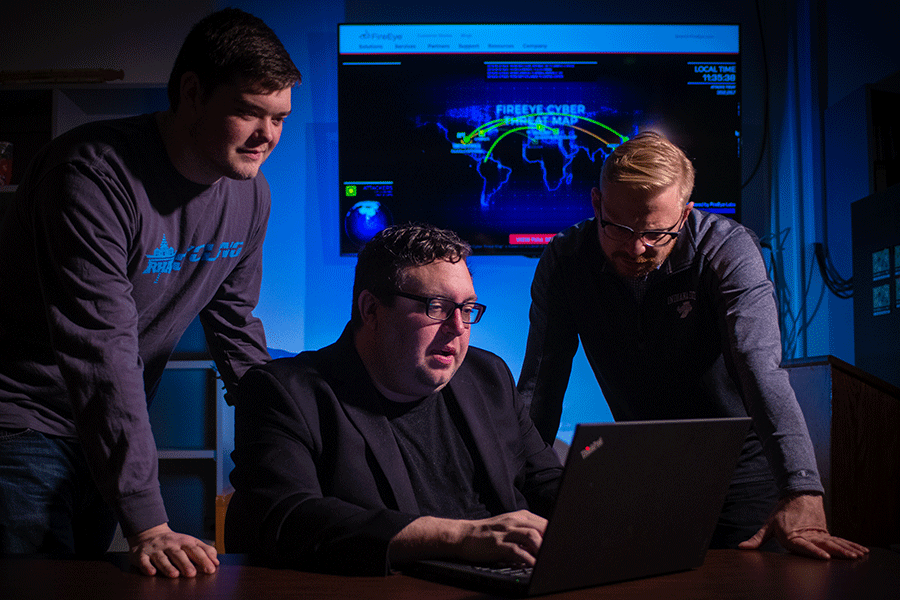Why Earn a Bachelor’s Degree in Cybercriminology and Security Studies at Indiana State?
The Bachelor of Science in Cybercriminology and Security Studies prepares you to detect, analyze, defend against, and prevent attacks on digital data and networks, physical locations, and personnel, using the latest technology and an advanced understanding of human behavioral habits and weaknesses.
Help Secure Networks, Property and Privacy
Data breaches, ransomware attacks, phishing schemes, identity theft, and other digital piracy compromise users’ data and cost companies and organizations millions. And physical threats to businesses, government buildings, personnel, and political, business, or entertainment personalities are ever-present.
Indiana State’s cybercriminology and security studies program helps you understand and develop the analytical and technological skills necessary to secure and protect people, property, and information. Just as importantly, it explores the human element of cyber- and security crimes, investigating how bad actors leverage curiosity, trust, fear, habit, and other common traits or emotions to compromise personnel and private citizens for criminal purposes.
Prepare for Industry-Leading Certifications
Indiana State’s Cybercrime concentration curriculum prepares you to obtain industry-leading certifications, including MCFE, CompTIA A+, Net+, Security+, SSCP/CISSP, and FAIR (Factor Analysis of Information Risk). The School of Criminology and Security Studies was among the first university programs in the nation to become FAIR-certified.
The School of Criminology and Security Studies has also been designated as a National Center of Academic Excellence in Cyber Defense by the U.S. National Security Agency and Department of Homeland Security. NSA and DHS jointly sponsor the CAE-CD with the goal of reducing vulnerability in our national information infrastructure by promoting higher education and research in cyber defense and producing professionals with cyber defense expertise.
Learn from Our Excellent Faculty
Award-winning faculty in the School of Criminology and Security Studies bring decades of industry experience and expansive professional networks to their classroom instruction. They teach small classes in a collaborative style that emphasizes teamwork, active inquiry, and hands-on practice as well as traditional lectures. Most hold doctoral degrees and engage in research and scholarly activities. All are dedicated to your success.
Your instructors will assist you with professional development, including career paths, internships, undergraduate research opportunities, participation at professional conferences, and other issues related to your professional growth.
Build Your Skills in our Cyber-Intel Lab
The Cyber/Intel Laboratory at Indiana State is a learning space for hands-on teaching and realistic simulations involving digital forensics, cybersecurity, and intelligence and behavioral analysis.
Equipped with the latest tools and technology – including an 85-inch Sony monitor and individual workstations with HP laptop computers, 32-inch LG monitors, and Gaming chairs – the Cyber/Intel Lab is a closed environment with limited access for faculty and a single Internet connection separated from the University’s main networks.
Learn more about our Cyber/Intel Lab.
Gain Experience Beyond the Classroom
The Cybercrime concentration in the Bachelor of Science in Cybercriminology and Security Studies program offers opportunities to gain practical field experience through internships, competitions, and community outreach.
- High-Tech Crime Unit
The School of Criminology and Security Studies offers paid HTCU internships in which you can work with area law enforcement as a sworn investigator performing computer, mobile, audio, and video forensics on evidence collected as part of criminal cases. - Electronic Data Analysis Section
You may also apply for an introductory unpaid internship, the Electronic Data Analysis Section, as preparation for the HTCU. Here, you will review data, such as video jail calls, phone calls, and texts, that may be helpful in law enforcement investigations. - CyberSycamore Club
As a member of the CyberSycamore Club, you will participate in collegiate and other cyber-competitions as part of supplemental, hands-on learning experiences that enrich your academic coursework. The Club also hosts workshops, career mentoring sessions, and guest speakers.
What You’ll Learn in the Cybercriminology and Security Program
The Bachelor of Science in Cybercriminology and Security Studies equips you with a comprehensive understanding of national, corporate, and cyber security theories and practices, and prepares you to operate on a supervisory level within security, law enforcement, and business environments.
You will take 21 credits of core criminology and criminal justice courses and will select either the Cybercrime or Physical Security concentration.

Concentrations
The Cybercrime concentration is 51 credits and emphasizes the technical, behavioral, and theoretical aspects of cybersecurity. Course topics include hardware and software, networking, security risk, digital forensics, computer and information security, cybercrime and criminal justice, cyber defense, and social engineering. The Cybercrime concentration may be taken as an on-campus, online, or hybrid program.
The Physical Security concentration is 51 credits and helps you develop the ability to analyze the global complexities and implications of corporate security, retail security, loss prevention, overall procedures, and operations.
Course topics include security management; institutional, industrial, and commercial security; school and campus security; border and coastal security; workplace safety; and fraud investigation, among other subjects.

Transfer Credit
Indiana State University accepts credit from regionally accredited colleges and universities within the United States, and from selected schools located outside the United States. Credit also may be granted for military training and experience. Previously earned college credit can be applied toward completion of the program per Indiana State's transfer guidelines.
Transfer GuidelinesCareer Possibilities for Cybercriminology and Security Studies Majors
Graduates from the Cybercriminology and Security degree program at Indiana State University will enter a soaring and lucrative job market. As the number, frequency, and complexity of cyberattacks increases worldwide, demand for highly qualified cyber-defense and digital forensics experts will continue to grow.
The Bureau of Labor Statistics projects that demand for Information Security Analysts, for example, will grow by 35 percent from 2021 – 2031. Physical Security majors enjoy a variety of appealing career options, including leadership positions in corporate, private, or retail security work, and homeland defense. Graduates are also prepared to pursue advanced degrees in security, cybersecurity, or criminal justice.

Following in Her Father's Footsteps
Indiana State University alumna Payton Ferency, '25, knew at a young age what career she wanted to pursue. Her father was a 30-year veteran of the Terre Haute Police Department and an FBI task officer, so it didn't surprise anyone in her family when she chose to study intelligence analysis related to counterterrorism. Through internships, volunteer activities, and study-abroad experiences, Ferency broadened her worldview in preparation for a career of impact and service.
Learn Payton Ferency's story.Accreditation
Indiana State University is accredited by the Higher Learning Commission.
The School of Criminology and Security Studies has also been designated as a National Center of Academic Excellence in Cyber Defense by the U.S. National Security Agency and Department of Homeland Security.
Related Programs
-

Intelligence Analysis (BS)
Bachelor's
-

Criminology and Criminal Justice (BS)
Bachelor's
-

Information Technology (BS)
Bachelor's


